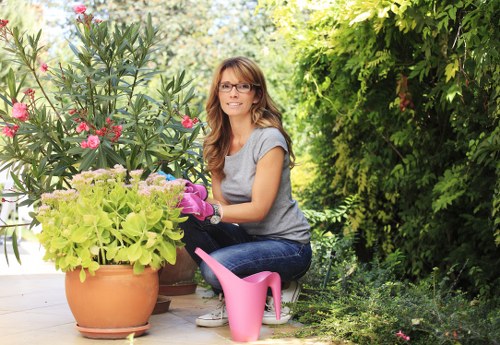Expert Garden Maintenance in Parsons Green: Keep Your Garden Pristine Year-Round

Introduction to Garden Maintenance in Parsons Green
Maintaining a beautiful garden in Parsons Green requires a blend of passion, knowledge, and the right techniques. Whether you're a seasoned gardener or a novice, understanding the essentials of garden maintenance is crucial for creating a lush, vibrant outdoor space.
Parsons Green, with its unique climate and diverse plant life, offers both challenges and opportunities for garden enthusiasts. Proper maintenance not only enhances the aesthetic appeal but also ensures the health and longevity of your plants.
In this comprehensive guide, we'll explore the best practices for garden maintenance in Parsons Green, providing you with the tools and tips needed to keep your garden thriving throughout the year.

Seasonal Garden Care
Effective garden maintenance involves adapting your care routines to the changing seasons. Each season presents unique challenges and requirements to ensure your garden remains in optimal condition.
Spring Maintenance
Spring is a time of rebirth and renewal in the garden. It’s essential to prepare your garden beds, prune overgrown plants, and start planting new seeds.
- Soil Preparation: Test and amend your soil to provide the necessary nutrients for growth.
- Pruning: Remove dead or damaged branches to promote healthy growth.
- Planting: Sow seeds and transplant young plants to kickstart the growing season.
Summer Maintenance
Summer brings warmth and longer days, which are perfect for plant growth. However, it also requires diligent care to manage heat stress and pests.
- Watering: Ensure consistent watering, especially during dry spells.
- Pest Control: Monitor for pests and use eco-friendly treatments as needed.
- Mulching: Apply mulch to retain moisture and regulate soil temperature.

Essential Garden Tools for Maintenance
Having the right tools is fundamental to effective garden maintenance. Equip yourself with these essential tools to make your gardening tasks easier and more efficient.
Basic Tools
- Hand Trowel: Ideal for planting, transplanting, and digging small holes.
- Pruning Shears: Essential for trimming and shaping plants.
- Garden Fork: Perfect for turning soil and aerating garden beds.
Advanced Tools
- Lawn Mower: Keep your lawn neat and well-maintained.
- Hedge Trimmer: For shaping hedges and large shrubs.
- Garden Hose: Ensure you have a reliable hose for efficient watering.
Investing in quality tools can save time and effort, making garden maintenance in Parsons Green a more enjoyable experience.

Plant Selection for Parsons Green Gardens
Choosing the right plants is crucial for a thriving garden in Parsons Green. Consider the local climate, soil type, and sunlight availability when selecting plants.
Perennials and Annuals
- Perennials: Plants that return year after year, such as lavender and echinacea, are excellent for long-term garden structure.
- Annuals: Fast-growing plants like marigolds and petunias provide vibrant color but require replanting each season.
Native Plants
Incorporating native plants can reduce maintenance needs, as they are well-adapted to the local environment and more resistant to pests and diseases.
Examples of Native Plants
- Bluebells: Beautiful spring blooms that thrive in shaded areas.
- Foxglove: Tall, striking flowers that attract pollinators.
- Heather: Evergreen plants that add color and texture to the garden.

Pruning and Trimming Techniques
Proper pruning and trimming are essential for maintaining plant health and enhancing the beauty of your garden. Understanding the correct techniques can prevent damage and promote vigorous growth.
When to Prune
Timing is critical when it comes to pruning. Different plants have specific pruning seasons to maximize their growth potential.
- Spring-Flowering Shrubs: Prune immediately after flowering to encourage new blooms.
- Summer-Flowering Shrubs: Prune in late winter or early spring before new growth begins.
- Trees: Prune during the dormant season to minimize stress.
Pruning Techniques
Use clean, sharp tools to make precise cuts. Follow these basic guidelines:
- Remove dead or diseased branches first.
- Thin out crowded areas to improve air circulation.
- Cut just above a bud or lateral branch to direct growth.
Trimming Hedges
For neat and structured hedges, use hedge trimmers and follow a consistent pattern. Regular trimming encourages dense growth and maintains the desired shape.
Soil Health and Fertilization
Healthy soil is the foundation of a thriving garden. Proper soil maintenance and fertilization ensure that your plants have the necessary nutrients to grow strong and resilient.
Soil Testing
Conduct regular soil tests to determine pH levels and nutrient content. This information helps you make informed decisions about soil amendments.
Amending the Soil
Depending on your soil test results, you may need to add organic matter, such as compost or manure, to improve soil structure and fertility.
Fertilization
Use appropriate fertilizers based on your plants' needs. Consider organic options to promote sustainable gardening practices.
- Nitrogen-Rich Fertilizers: Promote leafy growth.
- Phosphorus-Rich Fertilizers: Support root development and flowering.
- Potassium-Rich Fertilizers: Enhance overall plant health and disease resistance.
Composting
Creating a compost pile can provide a steady supply of nutrient-rich compost for your garden. Composting organic waste reduces landfill contributions and enriches your soil naturally.
Watering Strategies for a Healthy Garden
Effective watering is crucial for plant health, especially in the varying climate of Parsons Green. Implementing smart watering strategies can conserve water and ensure your plants receive the moisture they need.
Consistent Watering Schedule
Establish a regular watering routine tailored to your garden's specific needs. Early morning is the best time to water, minimizing evaporation and allowing plants to absorb moisture throughout the day.
Drip Irrigation Systems
Investing in a drip irrigation system can provide efficient, targeted watering, reducing water waste and promoting deep root growth.
Mulching Benefits
Applying mulch helps retain soil moisture, suppress weeds, and regulate soil temperature. Organic mulches, like wood chips and straw, add nutrients to the soil as they decompose.
Rainwater Harvesting
Collecting rainwater for garden use is an eco-friendly way to reduce reliance on municipal water sources. Set up rain barrels to capture runoff from your roof, providing a sustainable water supply for your garden.
Pest and Disease Management
Protecting your garden from pests and diseases is vital for maintaining plant health. Implementing integrated pest management (IPM) strategies can effectively control issues while minimizing environmental impact.
Identifying Common Pests
Be vigilant in monitoring your garden for signs of pests. Common garden pests in Parsons Green include aphids, slugs, and caterpillars.
Natural Pest Control Methods
- Beneficial Insects: Introduce ladybugs and lacewings to naturally control aphid populations.
- Neem Oil: Use neem oil as a non-toxic pesticide to deter various pests.
- Barriers: Employ physical barriers like row covers to protect plants from pests.
Managing Plant Diseases
Preventing plant diseases involves proper sanitation, adequate spacing, and avoiding overhead watering to reduce fungal growth.
Fungicide Use
If necessary, apply organic fungicides to treat and prevent disease outbreaks without harming beneficial insects or the environment.
Lawn Care Tips
A well-maintained lawn enhances the overall appeal of your garden. Follow these lawn care tips to keep your grass healthy and vibrant.
Mowing Practices
- Proper Height: Maintain your lawn at the recommended height for your grass type to promote strong roots.
- Sharp Blades: Use sharp mower blades to ensure clean cuts and reduce stress on the grass.
- Frequency: Adjust mowing frequency based on growth rates, typically cutting once a week during peak seasons.
Fertilizing Your Lawn
Apply fertilizers based on soil test results and grass species to provide essential nutrients for lush growth.
Overseeding
Overseeding helps fill in bare spots and improves lawn density, enhancing its resilience against pests and diseases.
Weed Control
Regularly remove weeds to prevent them from competing with your grass for nutrients and water. Use pre-emergent herbicides to stop weed seeds from germinating.
Garden Lighting and Aesthetics
Incorporating lighting and aesthetic elements can transform your garden into a stunning outdoor sanctuary. Thoughtful design enhances both functionality and beauty.
Garden Lighting Solutions
- Pathway Lights: Illuminate walkways for safety and visual appeal.
- Spotlights: Highlight key features like trees, sculptures, or water features.
- String Lights: Create a cozy ambiance for evening gatherings.
Decorative Features
Incorporate elements like garden sculptures, fountains, and benches to add character and charm to your outdoor space.
Plant Arrangement
Arrange plants in layers and varying heights to create depth and interest. Combine different textures and colors for a dynamic and inviting garden.
Hardscaping
Integrate hardscape features such as patios, walkways, and pergolas to enhance the functionality and structure of your garden.
Eco-Friendly Gardening Practices
Adopting eco-friendly practices ensures sustainability and minimizes your garden’s environmental impact. Implement these strategies to promote a greener garden.
Composting and Recycling
Recycling organic waste through composting enriches your soil while reducing landfill contributions.
Water Conservation Techniques
- Drip Irrigation: Delivers water directly to plant roots, reducing wastage.
- Rain Barrels: Collect and reuse rainwater for garden irrigation.
- Drought-Resistant Plants: Choose plants that require less water and are adapted to local conditions.
Natural Pest Control
Favor natural pest control methods over chemical treatments to protect beneficial insects and maintain ecological balance.
Beneficial Wildlife
Encourage wildlife such as bees, butterflies, and birds to visit your garden. They contribute to pollination and natural pest management.
Professional Garden Maintenance Services
For those who prefer expert assistance, professional garden maintenance services in Parsons Green offer comprehensive care solutions tailored to your garden’s needs.
Benefits of Hiring Professionals
- Expertise: Professionals bring extensive knowledge and experience to maintain your garden effectively.
- Time-Saving: Hiring experts frees up your time, allowing you to enjoy your garden without the hassle of maintenance.
- Customized Care: Professionals tailor their services to meet the specific requirements of your garden.
Services Offered
Professional garden maintenance services typically include:
- Lawn care and mowing
- Pruning and trimming
- Weed control
- Fertilization and soil management
- Planting and landscaping
- Pest and disease management
Choosing the Right Service
When selecting a garden maintenance service, consider their reputation, range of services, and customer reviews to ensure you receive high-quality care for your garden.
DIY Garden Maintenance Tips
For garden enthusiasts who prefer hands-on care, here are some DIY tips to maintain your garden efficiently.
Regular Inspection
Inspect your plants regularly for signs of pests, diseases, and nutrient deficiencies. Early detection allows for prompt treatment.
Proper Planting Techniques
- Spacing: Ensure adequate spacing to allow air circulation and prevent overcrowding.
- Depth: Plant seeds and seedlings at the appropriate depth for optimal growth.
- Support: Use stakes or trellises for plants that require support.
Mulching
Apply mulch to suppress weeds, retain moisture, and regulate soil temperature. Organic mulches enrich the soil as they decompose.
Harvesting and Deadheading
Regularly harvest fruits, vegetables, and flowers to encourage continuous production and maintain plant health.
Tool Maintenance
Keep your gardening tools clean and sharp to ensure efficiency and prolong their lifespan.
Creating a Sustainable Garden
A sustainable garden focuses on long-term health and environmental responsibility. Embrace these practices to create an eco-friendly garden in Parsons Green.
Organic Gardening
- No Synthetic Chemicals: Avoid using synthetic fertilizers and pesticides.
- Natural Amendments: Use compost and organic matter to enrich the soil.
- Crop Rotation: Rotate plant species to prevent soil depletion and reduce pest buildup.
Biodiversity
Promote biodiversity by planting a variety of species, which attracts beneficial insects and creates a resilient garden ecosystem.
Pollinator Gardens
Create areas dedicated to pollinators by planting nectar-rich flowers like lavender, sunflowers, and coneflowers.
Energy-Efficient Lighting
Use solar-powered garden lights to reduce energy consumption and minimize environmental impact.
Garden Safety and Best Practices
Ensuring safety in your garden is paramount. Follow these best practices to prevent accidents and maintain a safe gardening environment.
Tool Safety
- Wear Protective Gear: Use gloves, goggles, and sturdy footwear while gardening.
- Proper Handling: Handle tools carefully to avoid injuries.
- Storage: Store tools in a safe, organized manner to prevent accidents.
Chemical Safety
If using fertilizers or pesticides, follow the manufacturer's instructions carefully. Store chemicals out of reach of children and pets.
Ergonomics
Use ergonomic tools and maintain proper posture to prevent strain and injury during gardening tasks.
Sun Protection
Protect yourself from harmful UV rays by wearing hats, sunscreen, and long-sleeved clothing during extended periods outdoors.
Conclusion: Achieving a Flourishing Garden in Parsons Green
Maintaining a garden in Parsons Green is a rewarding endeavor that enhances your outdoor living space and contributes to environmental well-being. By following the best practices outlined in this guide, you can ensure your garden remains healthy, beautiful, and sustainable throughout the year.
Whether you choose to undertake garden maintenance yourself or enlist the help of professionals, the key is consistency and attention to detail. Embrace the seasonal changes, select the right plants, and implement effective care strategies to enjoy a flourishing garden in Parsons Green.
Ready to transform your garden? Contact us today to book your garden maintenance service and take the first step towards a stunning outdoor sanctuary.